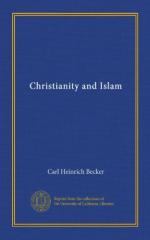Examples of this kind might be multiplied, but enough has been said to show that much and, to some extent, new light may be thrown upon the development of Christian tradition, by an examination of Muhammedanism which rose from similar soil but a few centuries later, while its traditional developments have been much more completely preserved.
Such analogies as these can be found, however, in any of the world-religions, and we propose to devote our attention more particularly to the influences which Christianity and Islam exerted directly upon one another. While Muhammedanism has borrowed from its hereditary foe, it has also repaid part of the debt. By the very fact of its historical position Islam was at first indebted to Christianity; but in the department of Christian philosophy, it has also exerted its own influence. This influence cannot be compared with that of Greek or Jewish thought upon Christian speculation: Christian philosophy, as a metaphysical theory of existence, was however strongly influenced by Arabian thought before the outset of the Reformation. On the other hand the influence of Christianity upon Islam—and also upon Muhammed, though he owed more to Jewish thought—was so extensive that the coincidence of ideas upon the most important metaphysical questions is positively amazing.
There is a widespread belief even at the present day that Islam was a complete novelty and that the religion and culture of the Muhammedan world were wholly alien to Western medievalism. Such views are entirely false; during the Middle Ages Muhammedanism and Western culture were inspired by the same spirit. The fact has been obscured by the contrast between the two religions whose differences have been constantly exaggerated and by dissimilarities of language and nationality. To retrace in full detail the close connection which unites Christianity and Islam would be the work of years. Within the scope of the present volume, all that can be done is to explain the points of contact between Christian and Muhammedan theories of life and religion. Such is the object of the following pages. We shall first treat of Muhammed personally, because his rise as a religious force will explain the possibility of later developments.
This statement also explains the sense in which we shall use the term Christianity. Muhammedanism has no connection with post-Reformation Christianity and meets it only in the mission field. Practical questions there arise which lie beyond the limits of our subject, as we have already indicated. Our interests are concerned with the mediaeval Church, when Christianity first imposed its ideas upon Muhammedanism at the time of its rise in the East, and afterwards received a material extension of its own horizon through the rapid progress of its protege. Our task is to analyse and explain these special relations between the two systems of thought.




